|
|
|
Sort Order |
|
|
|
Items / Page
|
|
|
|
|
|
|
| Srl | Item |
| 1 |
ID:
099818


|
|
|
|
|
| Publication |
2010.
|
| Summary/Abstract |
This article draws on principal-agent theories in the international organization literature and postagreement negotiation analysis in the negotiation literature to examine a case of international development negotiations among parties to the United Nations Convention to Combat Desertification. The role of the "collective principal" - the negotiating body of state actors that creates an international organization - is described and the analysis examines subsequent negotiations when the parties, as principal, do not coalesce into a collective actor regarding the mandate for the organization - or agent - they created. The article suggests that postagreement negotiation analysis provides an understanding of the vehicle through which the "principal" provides "collective" oversight of the agent, and examines what we label the "regime interpretation" negotiations involved with this case.
|
|
|
|
|
|
|
|
|
|
|
|
|
|
|
|
| 2 |
ID:
089896
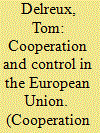

|
|
|
|
|
| Publication |
2009.
|
| Summary/Abstract |
This article examines the internal decision-making process in the European Union when the EU participates in international environmental negotiations. More particularly, the practical functioning of the relation between the member states and the EU negotiator (i.e. the Commission, the Presidency or a lead country), representing the member states externally, is examined. Starting from principal-agent theory and based on empirical research on eight EU decision-making processes with regard to international environmental negotiations, the article argues, first, that control by the member states on the EU negotiator takes place most manifestly during the course of the international negotiations, and, second, that these ad locum control mechanisms perform not only a control function, but also a cooperation function.
|
|
|
|
|
|
|
|
|
|
|
|
|
|
|
|
| 3 |
ID:
120290
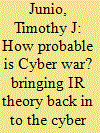

|
|
|
|
|
| Publication |
2013.
|
| Summary/Abstract |
Many well-established explanations for war suggest that cyber weapons have a greater chance of being used offensively than other kinds of military technologies. This response article introduces a research agenda for the study of cyber war, and offers an example - principal-agent problems in cyber operations - to demonstrate how rigorous theoretical and empirical work may proceed.
|
|
|
|
|
|
|
|
|
|
|
|
|
|
|
|
| 4 |
ID:
140260
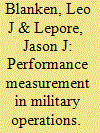

|
|
|
|
|
| Summary/Abstract |
We explore the impact of strategic assessment efforts on military organizations at war. To do so, we construct a model to explore the impact of a principal’s choice among imperfect performance metrics for a military operation. In doing so, the principal must consider both the incentivizing and informational properties of the metric. We show the conditions under which uncertainty regarding the nature of the agent, as well as uncertainty regarding the operational environment, drives a metric choice that induces pathological behavior from the agent. More specifically, a poor metric choice can create an overly optimistic assessment and end up prolonging the conflict. We illustrate the model’s insights in the cases of World War II and the Vietnam War.
|
|
|
|
|
|
|
|
|
|
|
|
|
|
|
|
| 5 |
ID:
092332
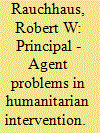

|
|
|
|
|
| Publication |
2009.
|
| Summary/Abstract |
A number of recent studies have concluded that humanitarian intervention can produce unintended consequences that reduce or completely undermine conflict management efforts. Some analysts have argued that the incentive structure produced by third parties is a form of moral hazard. This paper evaluates the utility of moral hazard theory and a second type of principal-agent problem known as adverse selection. Whereas moral hazards occur when an insured party has an opportunity to take hidden action once a contract is in effect, adverse selection is the result of asymmetric information prior to entering into a contract. Failing to distinguish between these two types of principal-agent problems may lead to policy advice that is irrelevant or potentially harmful. Along with introducing the concept of adverse selection to the debate on humanitarian intervention, this study identifies a commitment dilemma that explains why third parties operating in weakly institutionalized environments may be unable to punish groups that take advantage of intervention.
|
|
|
|
|
|
|
|
|
|
|
|
|
|
|
|
| 6 |
ID:
120311
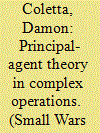

|
|
|
|
|
| Publication |
2013.
|
| Summary/Abstract |
Originally developed for identifying costs of coordination between labor and management in economics, principal-agent theory challenged traditional explanations for friction in political relations, especially in a democracy, between elected officials and the permanent bureaucracy. Not without controversy, the approach recasts democratic civil-military relations, featuring as agent a unique, military 'bureaucrat' refining goals of the state, a role normally assigned to the principal. At the same time, principal-agent applications reached international institutions as a collective actor in their own right. Drawing from civil-military relations and international institutions, this article poses still greater expansion for principal-agent dynamics. Principal-agent theory offers significant promise in complex international operations mixing inter-state, state, sub-state, and nongovernmental organizations because it clearly delineates culturally bounded normative arguments from resource-based logics; it also suggests moves such as building flexible membership institutions ahead of time to improve cooperation among international actors during the next crisis.
|
|
|
|
|
|
|
|
|
|
|
|
|
|
|
|
|
|
|
|
|